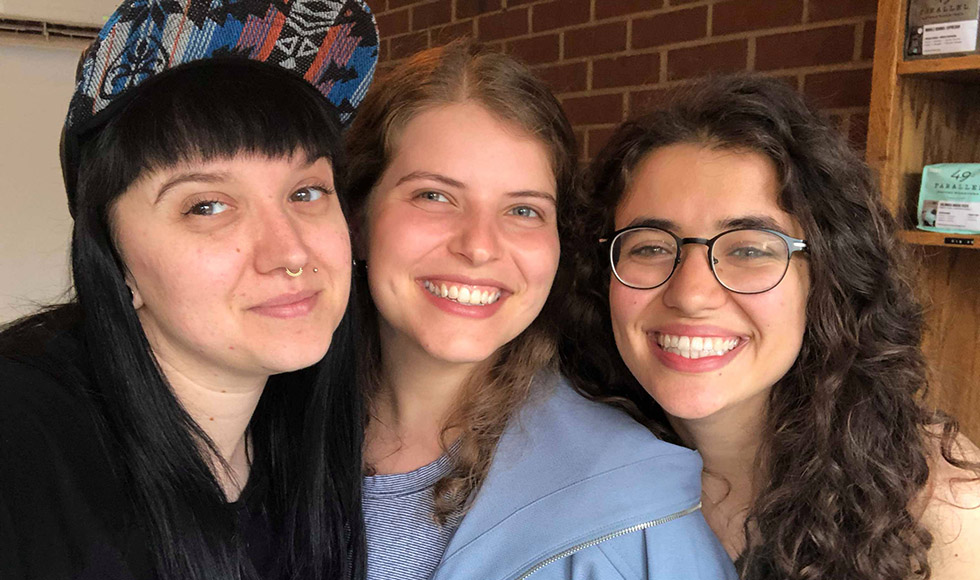Exploring how to be Indigenous allies through art, thanks to a Renaissance Award

Visual artist Dayna Danger (left) with Emily Siskos (centre) and Alexia Olaizola in Montreal.
Alexia Olaizola and Emily Siskos have just graduated from McMaster’s renowned Arts & Science Program. But that’s not the only thing on their mind these days.
For the past four months, they have crossed Canada from east to west and back again, exploring how Indigenous visual art is being used as a form of cultural reclamation and resistance. Olaizola and Siskos have visited public sites, taken in museum exhibits, viewed art both inside and outside of galleries, and met with Indigenous artists, curators, and community members.
Their goal? “We’re trying to learn what it means to be real, strong allies to Indigenous communities in Canada,” says Olaizola.
“There is so much that we still have to understand,” adds Siskos, “and sometimes it’s hard to get our minds wrapped around some of the simplest yet deepest ideas.”
In one of the posts in their blog, they reflect on the leg of their journey that brought them back to Toronto and Hamilton. “It was eye-opening to be back in our own communities. Even though we have lived in each of these cities for many years, we haven’t spent enough time learning about the Indigenous presence in our own homes (a reality we are trying to change).”
Their research has been funded by a unique award available only at McMaster. Created in 2012 by Mac grads Glen Bandiera and Jolie Ringash, the Renaissance Award is open to students of all levels from all Faculties. The award challenges students to think outside the box and create a learning experience that explores a subject not covered in their degree program. Olaizola’s and Siskos’s project was one of two successful applications this year, out of a pool of 37.
Their itinerary has taken them to Halifax, Montreal, Ottawa, Toronto, Hamilton, Winnipeg, Calgary, Vancouver, Victoria, and Manitoulin Island. They are ending their trip with a visit to Nimkii Aazhibikong, an Indigenous-led arts, language and culture camp for youth and elders located north of Elliot Lake, Ontario.
Olaizola and Siskos prepared for their journey by auditing Indigenous Contemporary Art from 1960 to the Present, taught by Rhéanne Chartrand, the inaugural curator of Indigenous art at the McMaster Museum of Art.
Their project supervisors are Dr. Rick Monture, associate professor in McMaster’s Indigenous Studies Program and English & Cultural Studies, and Carol Podedworny, director and curator of the McMaster Museum of Art.
This isn’t the first time that Olaizola and Siskos have travelled and studied as a team. They met in their first year of the Arts & Science Program, lived in the same residence, and went on exchange together to Lyon, France.
Both aim to work as policymakers in Canada. They hope to bring the knowledge and experience they have gained from this journey into careers in health, economics, and sustainability.
However, they stress that they have only scratched the surface with this cross-country project.
“If we want to emphasize anything, it’s that we’re here to learn,” they write from the field. “The real subject experts are our supervisors and mentors – and the artists we are meeting with.”
To learn (and see) more, visit:
- Their project blog: https://artalliesinquiry.wordpress.com/
- Their Instagram account: https://www.instagram.com/art.allies.inquiry/?hl=en
For more information on the Drs. Jolie Ringash & Glen Bandiera Renaissance Award, go to: https://sfas.mcmaster.ca/scholarships/renaissance-award/. Applications open September 1.
To learn more about McMaster’s Arts & Science Program, visit https://artsci.mcmaster.ca/


